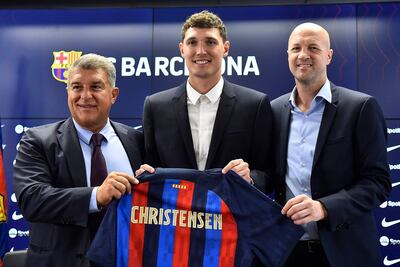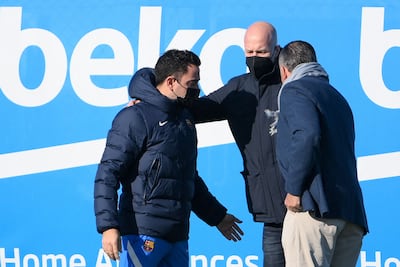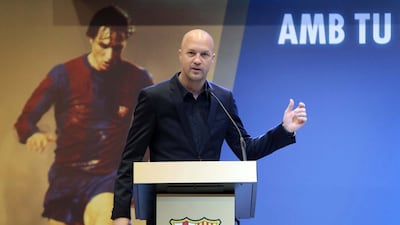Barcelona’s sporting director Jordi Cruyff will leave the club on June 30.
The former footballer turned coach, manager and sporting director does not have anything else lined up. He feels that he has done his job over two years, helped rebuild Barcelona into a title-winning team, and that it is time for something else.
Cruyff told Barcelona president Joan Laporta of his decision on Tuesday morning. Barca wanted Cruyff, 49, to stay after his good work in helping rebuild the side which has just won La Liga for the first time in four years.
The Dutchman was instrumental in bringing in several players, notably Andreas Christensen from Chelsea on a free transfer. He did the diligence himself, calling contacts in Denmark to check on the players’ personality and professionalism. The Dane has been a success alongside Ronald Araujo and Barcelona have by far the best defence in La Liga this season.
Cruyff wanted Barcelona to be more physical and intense, and sought out players with Premier League experience; Raphinha, chosen ahead of Antony from Ajax, was brought in from Leeds United.
With Barcelona needing to cut costs, Cruyff had to be creative with limited funds. He had worked this way in Israel, which was where he spotted a young Dutch coach who had been working as an assistant at FC Twente. Erik Ten Hag ended up joining Bayern Munich as reserve team manager.
At Barcelona, loan deals became a necessity amid a financial meltdown created by past profligacies. Cruyff oversaw the signing of Pierre-Emerick Aubameyang and Adama Traore in 2022. One was Catalan, one had family who lived near Barcelona. He also mediated when Barca felt that Ousmane Dembele was going to leave the club. Cruyff spoke to the French winger and established that he didn’t want to leave.
Cruyff had an excellent working relationship with Xavi Hernandez and acted as the conduit between the manager and the board of directors. Cruyff was not an office-bound sporting director. He attended every Barcelona training session and travelled to every game, home and away. When Cruyff suggested to Xavi that defender Eric Garcia should play in midfield ahead of a recent game at Elche, Xavi followed his suggestion and praised Cruyff publicly.
Describing his job, Cruyff said: “I’m close to the coach Xavi and [sporting director] Mateu (Alemany), who does negotiations. In England you might describe us as the football CEO, the sports director and the manager. This structure is normal in Spain but a few clubs like Man City have it in England. It’s been the past and the present in Spain – and it’s the future.

“I’ve also been a coach so I can see this from different perspectives, but English clubs, for example, give the keys to the coach who is the strongest person at the club – until he loses three games. Our system, our triangle here, gives us financial responsibility for the football area. It gives us balance, which is important for the club with different voices talking about the pros and cons of certain signings, for example.
“The coach is responsible for the line-up, the training, and the dressing room is his place. He’s the leader but there’s also a club philosophy which needs to be followed. We support the coach, we don’t go against him. It’s a modern way of thinking by dividing the power a little bit.”
A sports director, says Cruyff, is also a strategist. “There might be a really good right-back in the youth system but at the same time your coach might want a right-back. You might tell him that the youth right-back will be ready for the first team in one year and work a plan out, rather than spend a lot of money on a new right back who blocks the young player.”

Cruyff returned in 2021 to Barcelona, where he had been a player in the 1990s before joining Manchester United. There was no strategy in place, no ideas. Cruyff believes he has done his job and helped rebuild a team in difficult circumstances for the Catalan club.
Cruyff mixed with players and spoke to them about football and life, drawn from his own experiences in professional football working in Manchester, the Netherlands, Donetsk, Vigo, Vitoria, Cyprus, Israel, Malta, and China. When the players rushed off the coach at an away game at Almeria, he reminded them that the fans outside the airport had waited hours to see them.
When they played in Manchester in February, he told the players how important Old Trafford was in football.
When Cruyff departs, he will leave a list of names who have been properly scouted for the future of Barcelona. He always felt that, despite the financial challenges, Barcelona was still a club which top players wanted to play for.


